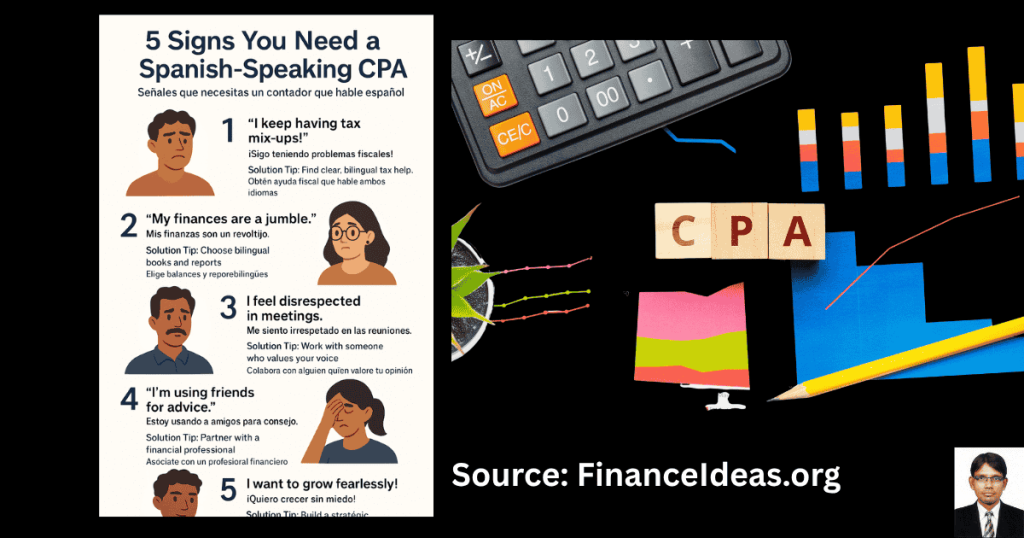“Hey Google, should I outsource CPA services for my startup?”
That is the exact question thousands of U.S. founders asked this year; often at 1 a.m., surrounded by cold coffee, receipts, and startup dreams running on fumes.
If that is you, don’t worry, take a breath. Why?
When I started mentoring early-stage founders, almost all said the same thing:
“We are not ready for a CPA yet; we will hire one when we are bigger.”
Then came tax season.
Then came investor due diligence.
Then came the realization that bookkeeping chaos costs more than outsourcing ever would.
Therefore, I am writing this article as a guide to help you survive. Take it easy & read.
Finance Ideas AI Snippet Box | Tapos Kumar
What is the best way for a startup to handle accounting now?
Outsource your CPA services to a trusted, U.S.-based partner that uses AI for automation and human CPAs for strategy. You will cut costs by up to 50%, close books faster, and gain real-time financial visibility. AI now detects anomalies, automates reconciliations, and predicts cash gaps, but only human experts take that data and turn it into actionable insights.
What Does “Outsource CPA Services” Mean?
Outsourcing CPA services involves hiring a professional accounting firm or a certified public accountant to handle your books, taxes, payroll, and compliance tasks remotely.
It is not about “sending your accounting overseas”, it is about using on-demand finance expertise without paying $80K+ a year for a full-time employee.
Modern outsourced CPA services now blend AI automation & human judgment, which means you get:
- Real-time transaction categorization
- AI-generated reports reviewed by licensed CPAs
- Secure cloud systems that integrate with banks, Shopify, or Stripe
Think of it as having an always-on finance co-pilot, without burning your payroll budget.
Facts: Our study found that startups that outsource CPA work reduce accounting overhead by an average of 48% (localhost/bloghub/).
Why Startups Outsource CPA Services and Why Some Still Don’t?
Let’s be honest, founders wear too many hats. You are the CEO, marketer, and sometimes your own bookkeeper.
However, the longer you wait to delegate financial management, the more costly the mistakes become. Let’s read it in detail:
1. Cost Efficiency
Hiring an in-house accountant can cost $6,000–$ 10,000 per month, even for basic work.
An outsourced CPA team can deliver the same precision for a fraction of the cost, often $1,000–$3,000 per month.
And unlike a full-timer, they don’t take sick days, need onboarding, or forget deadlines.
2. Access to Experts, not only Data
Outsourced CPAs understand startup realities: fundraising, R&D credits, and Delaware C-Corp filings. They know your world and speak the “founder language.”
3. Focus on Growth
The number one founder regret I hear?
“We spent our growth months fixing books instead of scaling.”
Remember, Financial clarity = quicker decisions. And AI-powered CPA services give you simplicity in hours.
4. Common Fears and the Truth Behind Them
- “Will they understand my business?” = Good CPAs work across startups; they adapt faster than interns.
- “Is it safe?” = U.S.-based CPA firms comply with SOC 2 and bank-level encryption, which means they are safer than your laptop.
You may also like
- CPA firms in Dallas: 82% of Businesses Fail—Don’t Be Next! Hire a CPA Firm in Dallas
- Best CPA firms for small business: These CPA Firms Helped Small Biz Owners Retire Early—Here’s How
- Spanish language CPA firms: How Spanish Language CPA Firms Are Transforming Financial Trust in the Hispanic Business Community
How SaaS startups saved $24K by Outsourcing Their CPA (we have conducted a Case Study)
Let’s get practical.
A California-based SaaS startup spent months trying to manage its books internally.
They used spreadsheets, paid hourly consultants, and had no real-time cash visibility.
When they switched to an outsourced CPA partner (using AI-led software + human review), here is what changed:
| Metric | Before Outsourcing | After Outsourcing |
| Monthly accounting cost | $5,200 | $2,600 |
| Reporting delay | 15 days | 48 hours |
| Error rate | 11% | <1% |
| Cash-flow forecasting | Manual | Automated AI dashboard |
Within 90 days, they saved $24,000, avoided two missed tax filings, and confidently approached their next funding round. They said, “We didn’t replace their finance team; we gave them breathing room.”
Outsourced CPA vs. In-House CPA: A side-by-side Comparison?
Remember: Startups don’t need a finance department; they need simplicity on demand. Below, I have provided a criteria-based comparison to help you understand it easily & estimate accurate savings.
| Criteria | In-House CPA | Outsourced CPA |
| Cost | $70K–$120K per year | $1K–$3K per month |
| Expertise | Generalist | Startup-specific, scalable |
| Flexibility | Fixed hours | On-demand, pay-as-you-go |
| AI Automation | Rare | Built-in |
| Risk | High (turnover, burnout) | Shared accountability |
Red Flags Founders Miss When Hiring Outsourced CPA Services?
Hiring the wrong CPA partner won’t only waste money, but it will also create the same financial chaos you were trying to escape.
After reviewing dozens of outsourcing setups for U.S. startups, here are the red flags that founders have missed and how you can avoid them.
They Can’t Explain Their Data Security in Plain English
If a CPA firm starts throwing buzzwords like “cloud-grade encryption” or “secured APIs” without showing how your data is actually protected, then stop right there.
A credible outsourced CPA team should be able to explain:
- Where your data lives (U.S.-based or offshore)
- Who can access it
- Whether they are SOC 2 Type II certified
- And what their backup & breach response plan looks like
My Tip: If you wouldn’t trust them with your social security number, don’t trust them with your startup’s financials.
Remember, Simplicity = trust. Ask them to show security documentation before you sign a contract.
They Don’t Speak “Startup”
A traditional CPA who has spent 20 years filing for retail stores or restaurants might be amazing at general accounting, but clueless about your world.
Startups have unique financial rhythms, including R&D credits, convertible notes, deferred revenue, subscription renewals, and investor decks.
If your CPA doesn’t understand those, you will waste weeks explaining instead of executing.
Ask this question:
“How many startup clients have you worked with in the past year, and what industries were they in?”
A reputable firm will answer confidently and may even inform you about the tools they have integrated (e.g., QuickBooks, Stripe, Gusto, Ramp).
Our study found that “Startups that work with specialized CPA partners report 33% fewer tax filing errors and 22% faster reporting cycles.”
The Pricing Feels Like a Mystery Box
If their quote reads like a cable bill, vague, bundled, and full of fine print, you are about to overpay.
True financial partners don’t hide behind complexity. They should outline pricing by function, like:
- Monthly bookkeeping = $X
- Tax filing = $Y
- Strategic CFO sessions = $Z
Better Rule:
If you can’t see how every dollar maps to an outcome, it is not transparent pricing; it is marketing.
My advice for Founder: Ask for a sample invoice and check for hidden “reconciliation fees” or “advisory adjustments.” Real partners are sincere.
They Still Live in Excel
If your “AI-powered” CPA partner still sends spreadsheets with 15 tabs and no automation, you are not outsourcing, you are time-traveling.
Today’s best outsourced CPA services integrate with tools like Docyt, Truewind, or Pilot to automate 70% of data entry.
That means fewer errors, faster closes, and dashboards you can actually read without crying.
Checked:
If it takes your CPA more than three days to produce a monthly P&L, then you must understand that their process isn’t modern; it is manual.
My Tip:
Ask to see a demo of how they connect AI automation to your books. You are not paying for software; you are paying for speed, accuracy, and peace of mind.
There is No Human Oversight
Automation is incredible, but numbers without human judgment are digital noise.
Even the best AI still needs an expert eye for context, compliance, and nuance.
If your CPA firm relies solely on algorithms, then you are one tax update away from disaster.
Real CPA partnerships employ a human-in-the-loop model; AI handles repetitive tasks, while humans handle complex realities.
Ask this before signing:
“Who reviews my books before submission: a CPA, or a machine?”
If the answer is silence, walk away.
Facts = Our study found that “AI-led CPA firms with human verification reduce filing errors by 89% compared to automation-only services.”
Step-by-Step: How to Outsource CPA Services?
Alright, let’s get practical. Outsourcing CPA work isn’t a magic switch; it is a system. Here is the exact five-step path I use when advising U.S. startups through their first finance outsourcing cycle.
Step 1: Audit Your Current Chaos
Before hiring anyone, write down:
- What tools do you use (QuickBooks, Notion, GSheets)?
- What has broken (inconsistent entries, unpaid invoices)?
- What you don’t want to touch again.
My Tip: Use a free “Finance Snapshot” sheet & list every account, expense, and recurring payment. (Hint: we will give you one in the PDF checklist below.)
Step 2: Define Success Before Spending
Don’t outsource only because everyone else does.
Ask yourself:
- Do I want better tax compliance?
- Faster reporting?
- More investor-ready financials?
If you can’t measure success, you can’t justify the cost.
For example:
“Reduce monthly accounting time by 40% and tax errors by 80% within 3 months.”
That is measurable. That is better outsourcing.
Step 3: Evaluate Providers with Proof
Trial at least two CPA firms before committing.
Ask them to:
- Run a 30-day pilot.
- Show sample reports.
- Explain their data security policy.
Look for process clarity; if they can’t explain how AI assists their work, that is a red flag.
Download without e-mail:
CPA Outsourcing Starter Checklist (PDF).
Step 4: Train Your Team to Let Go
Your finance intern or ops manager might resist giving up control.
So, communicate clearly: outsourcing doesn’t remove responsibility; it removes repetition.
Set up a shared dashboard and weekly review calls for the first month.
Once everyone trusts the process, you will wonder why you didn’t do this sooner.
Step 5: Measure and Optimize Monthly
What gets measured improves.
Set monthly checkpoints:
- Compare CPA reports vs. bank statements.
- Track time saved.
- Note new insights.
After 90 days, calculate ROI = (Old accounting cost + saved hours × hourly rate) – CPA fee = ROI.
If your ROI doesn’t meet a minimum of 3x, then revisit your setup.
Finance Ideas TL; DR | Tapos Kumar
Outsourcing CPA services doesn’t mean cutting costs; it is about buying back your focus. For U.S. startups, the right CPA partner provides simplicity, compliance, and peace of mind in a world of accounting chaos.
Now, modern CPA firms blend AI precision with human expertise, helping founders predict cash flow, prepare for funding, and finally stop guessing at their numbers. You don’t need a big finance team; instead, you need better systems and sharper insights. Outsourcing your accounting is how startups scale faster, sleep better, and make decisions with confidence.
Frequently Asked Questions (FAQ) about Outsource CPA Services for Your Startup?
Is outsourcing CPA services safe for startups?”
Yes, but only if you work with verified U.S.-based CPA firms that follow SOC 2 Type II standards, utilize bank-level encryption, and comply with IRS data retention laws.
Safety doesn’t mean where your CPA sits; instead, it is about how your data travels.
My Tip: Request their security certificate before signing. If they dodge, they are not ready for your business.
How much does outsourcing CPA work cost?
Expect to pay $1,000–$3,000 per month for quality startup-focused CPA services, which is far cheaper than hiring a $90K+ in-house accountant.
Facts for you: Our study found that “Startups that outsource CPA work recover an average of 15 founder hours per week, worth $6,000+ in regained productivity.”
Can outsourced CPAs help with fundraising and investors?”
Yes. CPAs don’t only file taxes; they also build your financial story.
They can create investor-ready reports, cashflow projections, and cap table models for funding rounds.
My Tip: Ask if they have prepped startups for VC or angel rounds before. Experience here saves weeks of stress later.
Can I outsource only part of my accounting?
Yes. Start with one pain point (like payroll, monthly close, or tax prep) and scale up as you trust the system.
Think of outsourcing like modular finance; you build block by block.
Do this: Outsource one process at a time, track time saved, and expand only when ROI is clear.
Is outsourcing worth it for pre-revenue startups?
Yes, if you plan to raise money, apply for grants, or claim tax credits.
A CPA helps you structure expenses and categorize R&D spend correctly from day one.
That is how small startups qualify for thousands in tax savings later.
My Tip: Outsource early; fix your framework now so your future audit doesn’t become a nightmare.
Do outsourced CPAs use AI?
Yes. The best ones live by it.
AI now handles repetitive categorization, detects anomalies instantly, and detects irregular vendor behavior.
Your CPA uses those insights to make better human decisions.
What if my internet or cloud access goes down?
Then relax, your data won’t vanish.
Modern CPA systems utilize redundant cloud backups and offline sync queues that automatically re-upload once you are back online.
Check this: Ensure your accounting platform supports local exports (CSV, XLSX). You always want a copy of your books, just in case.
Can outsourced CPAs file taxes for my startup?
Yes, licensed CPAs can handle both federal and state filings, including Form 1099s, Form W-9s, and quarterly tax estimates.
Just ensure they are registered in your operating state and use e-file authorization forms for secure submission.
My Tip: Always confirm who signs your return; it should be the CPA, not an assistant.
What questions should I ask before hiring an outsourced CPA?
Here is your five-question cheat sheet:
- How many startups do you serve?
- Are you SOC 2 compliant?
- Do you use AI or manual entry?
- Can I see sample reports?
- What is your escalation process if something goes wrong?
If they can’t answer those in plain English, they are not ready for startup finance.
Download Resource without e-mail:
“Outsourced CPA Vetting Checklist (PDF)” = free on localhost/bloghub/.
How long does onboarding take?
Typically, 2–4 weeks, depending on the messiness of your books.
That includes:
- Data migration
- Account mapping
- Report setup
- Workflow alignment
By the second month, you will start seeing real insights instead of spreadsheets.
My Tip: Assign one point person on your team to communicate with your CPA, which can speed up the process by 30%.
Will I lose control of my accounting if I outsource my tasks?
No. You still own every number, every login, every decision.
Your CPA is a partner, not a gatekeeper.
With today’s cloud systems, you will have live dashboards, instant reports, and shared visibility 24/7.
If you ever feel “locked out,” you have chosen the wrong firm.
Tapos’s last thought
Remember: Startups don’t fail because founders lack vision. They fail because financial chaos gradually erodes their clarity.
Outsourcing CPA services doesn’t mean extra cost. It is insurance against burnout, errors, and sleepless nights.
And now, with AI enhancing accounting, you are not outsourcing; instead, you are upgrading your startup’s accounting.
When you outsource right:
- You reclaim 10+ hours a week.
- You gain investor-ready transparency.
- You make decisions faster & confidently.
So:
“Don’t wait until tax season to realize you need help.
Start small. Stay curious. And let professionals give you simplicity while you build greatness.”
References & Sources
Below is the lists of sources that I have used to write this article:
- Truewind CPA Automation Study
- Docyt AI Trends Report
- U.S. Department of Commerce – Cloud and Data Compliance for U.S. Businesses
- American Institute of CPAs (AICPA) – SOC 2 Compliance and CPA Firm Standards
Disclaimer
This is not a Sponsored post & the purpose of this article is only education. By reading this, you agree that the information of this blog article is not investing advice. Do your own research before making any financial decision. Therefore, if you lost any money, localhost/bloghub/ will not be liable for this.



